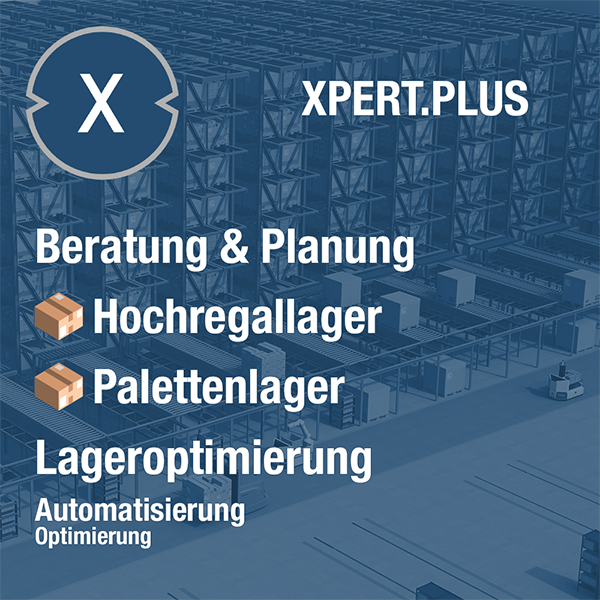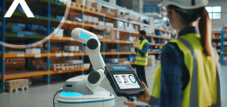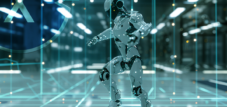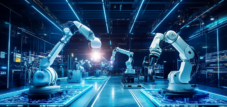The robotics transformation and the kiva robot in Amazon's logistics and distribution centers
Xpert pre-release
Language selection 📢
Published on: May 11, 2025 / update from: May 11, 2025 - Author: Konrad Wolfenstein

The robotics transformation and the kiva robot in Amazon's logistics and distribution centers-creative image: Xpert.digital
Transformation of logistics: Amazon's Kiva story
Amazon's logistics strategy - The silent revolution: Robot change Amazon supply chains
Since the strategic takeover of Kiva Systems in 2012, Amazon has fundamentally transformed its logistics centers and is increasingly relying on robot technology to increase efficiency and productivity. What started with an investment of $ 775 million has developed into a comprehensive network of hundreds of thousands of robots that have become indispensable today in Amazon's global logistics infrastructure. This development not only shows the technological innovation of the company, but also a fundamental change in the way in which modern logistics work.
Suitable for:
- Tactile robotics: robot with sense of touch-the new generation of vulcan and co-research on haptic object recognition

The beginning: the Kiva takeover as the cornerstone of automation
In March 2012, Amazon caused a sensation when the group took over the manufacturer of warehouse robots Kiva Systems for $ 775 million. This acquisition was the second largest takeover in the company's history of the online retailer and laid the foundation for Amazon's way to the robotics superpower.
Kiva Systems, a company from North Reading in the US state of Massachusetts, specialized in the development of flat orange-colored robots that transport shelves with goods to employees. This technology has already been used by some retailers, including two companies previously taken over by Amazon: the shoe retailer Zappos and the baby article provider Diapers.com. The increase in efficiency was impressive: According to the manufacturer, employees were able to cope with twice as much work with the help of robots, while Amazon managers even spoke of an increase in productivity by three to four times.
After the takeover, Kiva Systems was renamed Amazon Robotics and the robots were initially used exclusively in Amazon logistics centers. A remarkable change, since Amazon no longer sold the technology developed to competitors, but used it exclusively for his own needs.
The development of the Amazon robot fleet
A diverse fleet of specialized robots developed from the original KIVA robots over the years:
The work animals: Kiva/Drive robot
The orange Kiva robots, later referred to as “Drives”, form the backbone of the Amazon logistics. They navigate through the warehouses by means of a system of computerized barcode stickers on the floor. With a weight of around 145 kilograms, you can transport up to 340 kilogram shelves and move at a speed of 5.5 kilometers per hour. The robots are battery operations and have to be charged every hour for five minutes.
These robots fundamentally revolutionized the work in the logistics centers: Instead of that employees had to cover kilometers through the warehouses, the robots bring the goods directly to them.
Proteus: The autonomous colleague
In July 2022, Amazon presented his first “completely autonomous mobile robot” with Proteus. In contrast to previous models that had to operate in separate areas, Proteus can recognize and avoid people using advanced security, perception and navigation technology. This ability enables him to work in the same areas as human employees-a significant further development in human-robot cooperation.
Cardinal: The precise packageer
Cardinal, a robotic gripping arm, can lift and sort packages with a weight of up to 25 kilograms. It was developed to optimize the parcel sorting in an earlier phase of the shipping process, which shortens the processing time and accelerates the entire process. Amazon plans to use Cardinal in his camps from 2024.
Vulcan: The robot with “sense of touch”
The latest innovation in Amazon's robot fleet is Vulcan, a robot with a “sense of touch”, which was presented in 2025. In contrast to conventional industrial robots, which either stop or drive through unexpected contacts, Vulcan can actually "feel" its surroundings.
Vulcan uses a system from a so -called “ruler” with which it can put on objects in subjects, and a “hair straightener” (paddles), the arms of which can adapt their handle thickness depending on the size and shape of the object to be moved. With this technology, Vulcan can handle around three quarters of millions of products in the Amazon range.
The robot is already used in the logistics center in Winsen near Hamburg, where it supplies goods at difficult to access places, making the work more secure and more efficient for employees.
Suitable for:
The massive scaling: from hundreds to hundreds of thousands
The spread of robot technology in Amazon's logistics network was impressive pace:
- 2015: The first robot in Europe used in the logistics center in Wroclaw (Poland)
- 2019: More than 200,000 robots in Amazon's warehouses in action
- 2025: Amazon operates the world's largest fleet of 750,000 industrial robots
The financial expert Cathie Wood forecast in 2023 that Amazon will have more robots than people in his warehouses by 2030, with around 1,000 new robots a day. This development is already a reality in the latest warehouses: more robots than humans are already working here.
Effects on efficiency, security and employees
Revolutionary efficiency increases
The use of robots has dramatically improved efficiency in Amazon's logistics centers. Where employees previously had to cover kilometers of kilometers, they stand on platforms and wait until robots bring the products to them. This leads to:
- An increase in productivity per warehouse worker by three to four times
- Higher stocks and faster delivery times
- More efficient use of the storage space
Improvement of occupational safety
Robot technology contributes significantly to increasing security in the logistics centers:
- Robots take on physically exhausting tasks and thus reduce the physical stress of the employees
- Company data show that the rates of documented incidents and downtimes in 2022 were 15% or 18% lower at locations with Amazon robotics than in locations without robotics
Transformation of the world of work
While critics fear that robots could replace human workers, Amazon emphasizes that around 300,000 new full -time positions have emerged worldwide since the introduction of robot technology in 2012. However, the type of work changes:
- Employees no longer have to walk through the warehouses, but work in hospital at packing stations
- New job profiles and career opportunities are created, especially for the maintenance and monitoring of the robots
- Technical skills are increasingly being demanded while physically exhausting tasks take over
The future: The distribution center of tomorrow
Amazon continues to invest massively in the development of new robot technologies. More than 700 million euros flow into technologies for the “distribution centers of the future”. In the development center for the last mile in Dortmund, Amazon has built a worldwide unique test system in which the technologies are developed, which are intended to shape the next decade of parcel delivery. The first complete implementation of this concept is planned for 2026.
The recent developments such as the “feeling” robot vulcan indicate that Amazon is increasingly relating to robots that can take on increasingly complex and demanding tasks. The focus is not only on increasing efficiency, but also on improving working conditions for human employees.
A transformation with far -reaching consequences
The takeover of robots in Amazon's logistics and distribution centers is not a mere technological gimmick, but a fundamental transformation of the entire industry. What started with the takeover of Kiva Systems in 2012 has become one of the largest industrial automation initiatives in the world.
The increasing number and diversity of the robots used shows that Amazon consistently relies on automation, but without completely avoiding human labor. Rather, new types of cooperation between people and the machine are created, in which robots take over repetitive and physically exhausting tasks, while people can concentrate on more complex activities.
The future of Amazon's logistics is likely to be characterized by an even closer integration of robotics and artificial intelligence, with the aim of making the supply chain even more efficient, safe and faster. For the logistics industry as a whole, Amazon sets standards that will also influence other companies in the long term.
Xpert partner in warehouse planning and construction
New opportunities for SMEs: DHL invested in fulfillment capacities
Advantages of KIVA robots compared to other automation solutions
1. A significant increase in productivity
- Kiva robots enable warehouse workers to create twice as much as with conventional automation solutions. Kiva states that the productivity of the warehouse employees can be increased by three to four times.
- A new article can be presented every six seconds, which means that orders can be handled in a very short time.
2. Flexibility and scalability
- In contrast to permanently installed conveyor belts or automated high-bay bearings, KIVA robots are small, autonomously acting units that can flexibly navigate through the warehouse and bring shelves to any position.
- The system can be scaled almost indefinitely: Depending on the need, more robots or shelves can be added without major structural changes.
3. Optimal use of the storage area
- Since the robots bring the shelves to the inpatient employees, warehouse workers no longer have to cover long distances. This significantly reduces physical stress and saves time.
- The storage areas do not have to be illuminated or heated because the robots can work even in the dark and low temperatures. This saves energy and operating costs.
4. Lower personnel requirements and higher ergonomics
- The human workforce is concentrated on the removal and picking of the goods at the picking stations. Fatigue, legally prescribed breaks or distraction hardly play a role in the camp process.
- The physical stress of the employees decreases because they work inpatient and no longer have to walk through the camp for miles.
5. Simple integration and low infrastructural requirements
- KIVA systems only need sufficient electricity, suitable robots and shelves as well as flat surfaces. Elaborate conveyor technology or special building structures are not required.
6. Particularly suitable for wide range pallets
- The solution is ideal for warehouse with heterogeneous products and for providers with a wide range, as is common in e-commerce.
Comparison with other systems
The comparison between KIVA robots and classic automation systems such as conveyor belts or high-bay bearings shows significant differences in central points. KIVA robots are characterized by very high flexibility, while classic automation systems only offer low to medium adaptability. The KIVA robots also score with regard to scalability, since they can be expanded modularly and cost-effective, while classic systems are often limited and expensive to adapt. The energy efficiency of the KIVA robots is also remarkably high, for example, since no light is required for the operation, while classic systems are only medium to low. For employees, KIVA robots offer an ergonomically advantageous way of working with inpatient workplaces and minimal walking paths. In contrast, classic systems require a lot of running work, which worsens ergonomics for employees. The investment requirement for KIVA robots is moderate because they are modularly expandable, whereas classic systems are associated with high costs for large systems and conversions. Finally, it turns out that KIVA robots can be particularly well adapted to different range widths, while classic automation is usually optimized for homogeneous goods and is therefore less adaptable.
Compared to classic automation solutions, KIVA robots offer unprecedented combination of flexibility, scalability, energy efficiency and ergonomics. They are particularly suitable for dynamic, heterogeneous storage environments such as in e-commerce and enable a significant increase in productivity with the same physical stress on the employees.

Xpert.Plus warehouse optimization - high-bay warehouses such as pallet warehouses consulting and planning
We are there for you - advice - planning - implementation - project management
☑️ SME support in strategy, consulting, planning and implementation
☑️ Creation or realignment of the digital strategy and digitalization
☑️ Expansion and optimization of international sales processes
☑️ Global & Digital B2B trading platforms
☑️ Pioneer Business Development
I would be happy to serve as your personal advisor.
You can contact me by filling out the contact form below or simply call me on +49 89 89 674 804 (Munich) .
I'm looking forward to our joint project.
Xpert.Digital - Konrad Wolfenstein
Xpert.Digital is a hub for industry with a focus on digitalization, mechanical engineering, logistics/intralogistics and photovoltaics.
With our 360° business development solution, we support well-known companies from new business to after sales.
Market intelligence, smarketing, marketing automation, content development, PR, mail campaigns, personalized social media and lead nurturing are part of our digital tools.
You can find out more at: www.xpert.digital - www.xpert.solar - www.xpert.plus




























